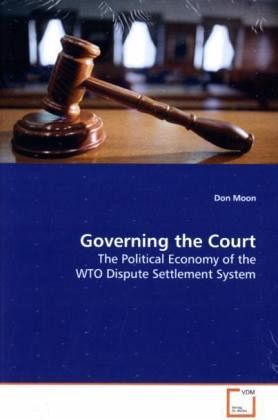
Governing the Court
The Political Economy of the WTO Dispute Settlement System
Versandkostenfrei!
Versandfertig in 6-10 Tagen
39,99 €
inkl. MwSt.

PAYBACK Punkte
20 °P sammeln!
International law and legal institutions have played an increasingly significant role in contemporary world politics. The most distinctive development is the legalization of dispute settlement mechanisms of global trading regimes. Due to the key features of the legal system - clear substantive/procedural rules and independent legal bodies, the WTO DS system produces an efficiency improvement, a utility enhancement, and a distributive effect. By combining a statistical analysis, case study, and game-theoretic analysis, this study contributes to comprehensive and systemic understanding of the WT...
International law and legal institutions have played
an increasingly significant role in contemporary
world politics. The most distinctive development is
the legalization of dispute settlement
mechanisms of global trading regimes. Due to the key
features of the legal system - clear
substantive/procedural rules and independent legal
bodies, the WTO DS system produces an efficiency
improvement, a utility enhancement, and a
distributive effect. By combining a statistical
analysis, case study, and game-theoretic analysis,
this study contributes to comprehensive and systemic
understanding of the WTO DS system. Given the
critical role of the WTO in managing contentious
disputes among the member states, this book can shed
light on how the organization should be revised to
become a more efficient, stable, and equitable
institution. This book is expected to be useful not
only to professionals in the field of
international relations, economics, and law, but
also to practitioners in global trade who needs to
understand the political and economic interactions
under the WTO.
an increasingly significant role in contemporary
world politics. The most distinctive development is
the legalization of dispute settlement
mechanisms of global trading regimes. Due to the key
features of the legal system - clear
substantive/procedural rules and independent legal
bodies, the WTO DS system produces an efficiency
improvement, a utility enhancement, and a
distributive effect. By combining a statistical
analysis, case study, and game-theoretic analysis,
this study contributes to comprehensive and systemic
understanding of the WTO DS system. Given the
critical role of the WTO in managing contentious
disputes among the member states, this book can shed
light on how the organization should be revised to
become a more efficient, stable, and equitable
institution. This book is expected to be useful not
only to professionals in the field of
international relations, economics, and law, but
also to practitioners in global trade who needs to
understand the political and economic interactions
under the WTO.












